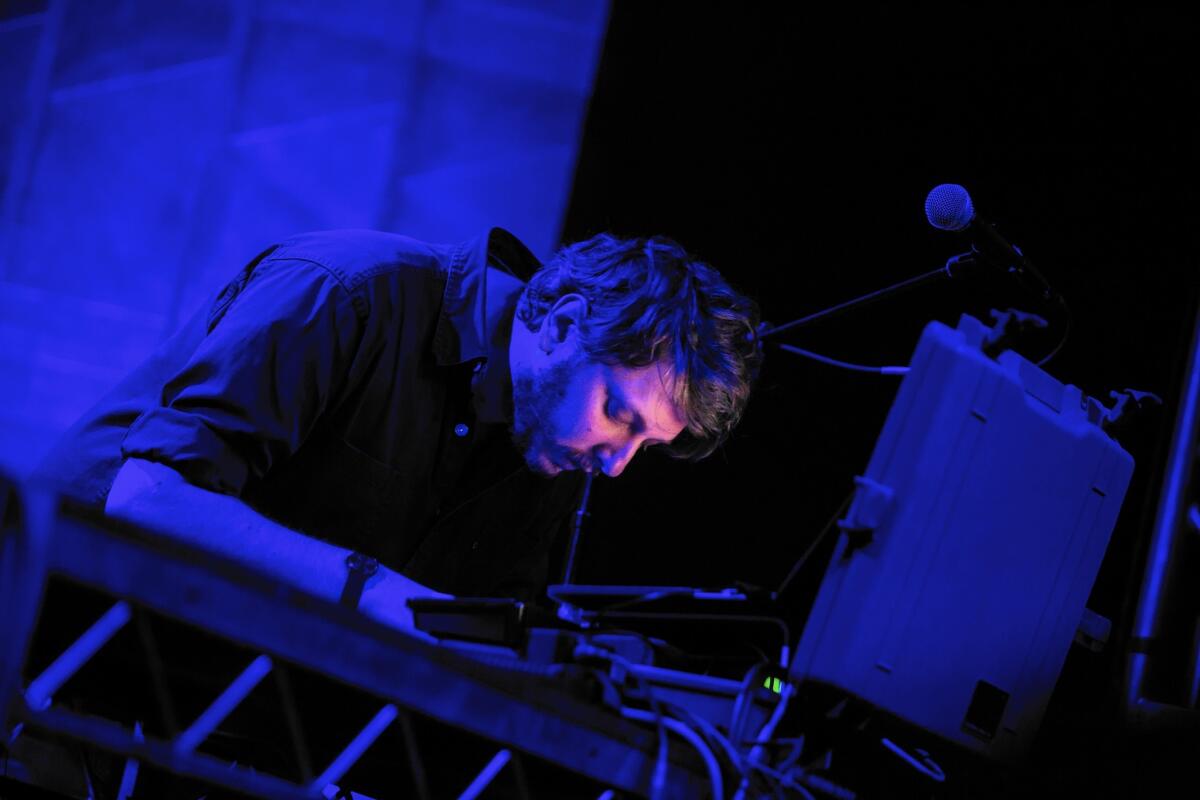Dan Lopatin doesn’t just push boundaries with Oneohtrix Point Never, he tramples them

“I am not an egghead in the least”: Dan Lopatin of Oneohtrix Point Never during his Los Angeles performance in November at the Regent.
What year is it?
Dan Lopatin, the sole constant member of Oneohtrix Point Never, was born in 1982 to parents who emigrated from Russia to Wayland, Mass.
The latest Oneohtrix album, “Garden of Delete,” was released in 2015.
Metallica’s “Ride the Lightning” was released in 1984.
Aside from being an eternally popular band, Metallica may seem irrelevant to a casual fan of Oneohtrix Point Never, a project filed under electronic music alongside synthesizer improvisations and digital constructions. Lopatin’s career, though, is as much an investigation of processing across genre and time as creation.
Right now, Lopatin is processing Metallica, trolls, thick keyboard patches, Russia, America, the Internet, romance and chrome. Scroll backward.
Lopatin’s father, Len, played drums in an outfit called the Flying Dutchmen, which in 1969 played Manfred Mann’s “Hubble Bubble (Toil and Trouble)” during a competition for best rock band in Leningrad. They placed eighth.
“In the Soviet Union it was way more rare and based to cover Western songs than write originals,” Lopatin said after Oneohtrix Point Never played in late November at the Regent in Los Angeles. “Ingenuity was measured by how close you could replicate illegal jams.”
Join the conversation on Facebook >>
“Garden of Delete” is 46 minutes of what could be illegal jams, if you imagine all of the audio coming from elsewhere. Lopatin has done it before. 2011’s “Replica” is constructed almost entirely from samples of late-night commercials, which were modulated.
“I am not an egghead in the least,” Lopatin said. “Synthesis is not a factor for me. I’m interested in the plasticity of audio. Once I get it as audio, then I start thinking about it in a modular way. How do I, literally, modulate this audio? I am never thinking about using synthesis to create complex sounds.”
0PN’s latest album is a clutch of signals at war with one another. You hear the keyboard sounds Lopatin has been using for at least eight years, tones that recall trance, New Age, Vangelis, medical equipment commercials and failed detective shows. The layers of guitar and processed voice never settle into something as soothing as the plangent ripple of “Replica” or the synth museum tour of 2009’s “Rifts.” “Garden of Delete” is wired and restless, beautiful despite the churn of processing.
Who are the jams for? Where are they from? Look to a 17-headed troll or a “hypergrunge” band called Kaoss Edge, neither of which exist. (Lopatin planted evidence of Kaoss Edge by creating a Blogspot account for the band. The first entry is dated Aug. 4, 1994, which would surprise the inventors of the Blogger, who launched the service in 1999.) Or imagine Metallica, who were summoned at the Regent show, which went heavy on lightning — the screens and haze and strobes suggesting the energy of EDM, one generation’s arena rock.
“With the silver trusses, the white strobes and a very dim blue light, it gives the appearance, when it flashes, of the cover of ‘Ride the Lightning,’ over and over, all night,” Lopatin explained. “Other than two moments, which are ballads, which go red, we’re trying to have this ‘Ride the Lightning’ blue silver energy power.”
The current Oneohtrix live lineup features Lopatin playing keyboards, controlling controllers and singing. Nate Boyce, who has also played with Matmos, plays a Steinberger electric guitar. The crowd at the Regent did not respond to the duo as if they were watching guys with laptops, although sometimes they were.
“They moshed to 0PN. They actually did. It was the first time I’ve ever seen that,” Lopatin said. “But they’re moshing to EDM satire, which is crazy.”
Lopatin introduced the many-headed troll at the Regent show by speaking into a Vocoder “like Freddy Krueger,” as he described it.
“What is a troll?” were Lopatin’s first words. He was both discussing the character and playing him. As Lopatin explained it after the show, the presence is “he” and “it,” persona and strategy. “This thing steals energy from a pop progression,” Lopatin said. “You’ll hear a sugary thing and then a violent toxic thing attached to it, which is sucking from it. That’s how I imagine a lot of the album. But it’s all still kind of songs.”
The first section of “Sticky Drama,” from “Garden of Delete” is innocent and inhuman. A synthetic piano soaked in synthetic echo gives way to a synthetic voice carrying a melody so violently filtered that only someone with the lyric sheet could know the words. “Sticky drama is the girl for me, she’s so sticky from the memories.” (Whose memories? From when?)
After 1 minute, 40 seconds, the troll — or at least the same voice Lopatin used on stage — says, “Anyway,” just barely exhaling the three syllables, as if the oxygen had just been vacuumed out. “When he — it — says ‘anyway,’ it’s a pivot,” Lopatin said. “That word is a musical gesture, a formal split. It’s the beginning of the grind section, which totally negates the A section. The two voices are entangled in a conversation for the first few cycles of the song. As the journey continues through the song, they congeal. It’s like, if you see the title of a movie in cursive, you think it’s a melodrama, right? That opening piano is melodramatic to me. Then that cursive returns, but it’s all chromed out. It’s been infused with all of that weird stuff the creature laid down. They become one thing. The whole album is like that, little formal adventures.”
Those adventures take a listener through so much territory that anybody moshing at a Oneohtrix Point Never show can be forgiven for not finding the line between satire and subject of satire. Even if EDM has never crossed Lopatin’s mind, what is it but a combination of Metallica’s audience with some loose coalition of electronic music fans? Different roads, same cul de sac.
Oneohtrix Point Never albums gather in the commentary of the moment so that musical gestures — the chatter of digital processing that signals computers are at work — are folded into social gestures. The troll is present in our political process and our online lives; you don’t have to have any interest whatsoever in Lopatin’s music to have an experience like one of the nameless voices on “Garden of Delete.” You’re remembering or trying to remember, and then an unidentified voice obscures your own. Your memories can be blocked, unless you keep them off the grid. And Lopatin’s own vision of blue silver energy doesn’t have to match up with his audience’s vision of what they might or might not be moshing to.
Or what year it is.
Twitter: @sfj
MORE ENTERTAINMENT NEWS
High-flying photographer Vincent Laforet captures the radiant world below him
‘Star Wars’ surpasses ‘Titanic’ and ‘Jurassic World,’ breaking more box office records
At Palm Springs International Film Festival, major stars and plucky upstarts share the spotlight
More to Read
The biggest entertainment stories
Get our big stories about Hollywood, film, television, music, arts, culture and more right in your inbox as soon as they publish.
You may occasionally receive promotional content from the Los Angeles Times.










